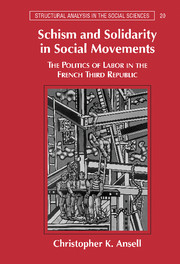Book contents
- Frontmatter
- Contents
- Acknowledgments
- 1 The Struggle and the Conciliation
- 2 Schism and Solidarity
- 3 Vox Pouli, Vox Dei
- 4 Esprit de Corps
- 5 Organizing the Fourth Estate
- 6 The New Covenant
- 7 “Above All We Are Syndicalists”
- 8 From Congregation to Reformed Church
- 9 Dealignment
- 10 The Party the Syndicalists Built
- 11 Conclusion
- Works Cited
- Index
2 - Schism and Solidarity
Published online by Cambridge University Press: 21 July 2009
- Frontmatter
- Contents
- Acknowledgments
- 1 The Struggle and the Conciliation
- 2 Schism and Solidarity
- 3 Vox Pouli, Vox Dei
- 4 Esprit de Corps
- 5 Organizing the Fourth Estate
- 6 The New Covenant
- 7 “Above All We Are Syndicalists”
- 8 From Congregation to Reformed Church
- 9 Dealignment
- 10 The Party the Syndicalists Built
- 11 Conclusion
- Works Cited
- Index
Summary
A generic model of organizational schism can be constructed around Max Weber's simple and widely known analytical distinctions between different types of social relationships. Weber distinguished two basic dimensions: associative versus communal relationships (vertical axis) and open versus closed relationships (horizontal axis). The labels given to the four cells of the resulting table (Table 2.1) resonate with contemporary parlance: fellowship (open, communal), clan (closed, communal), interest association (open, associative), and bureaucracy (closed, associative).
My basic argument is that organizational schisms will occur when communal groups move toward closure – from fellowship to clan. Communal closure entails the articulation of sharply drawn symbolic and behavioral boundaries between in-group and out-group, an elaborated “closed” ideology, hierarchical authority, centralized control of ritual, and a process of depersonalization (of individuals or constituent units). Communal closure represents an alternative path of organizational rationalization to Weber's well-known analysis of routinization as a strategy of organizational maintenance (and may be initiated in opposition to it); instead, communal closure corresponds to Weber's analysis of the transformation of a religious sect into a hierocratic organization (church). In that transition, personal charisma is transferred to the institution of the church, and a priestly corps monopolizes the “administration of grace.” Communal closure is a likely strategy of organizational maintenance (in contrast to routinization) the more that community is regarded as an end in itself, that is, when communal identity is a large part of individual identity or when it is treated as an object of sacred reverence.
- Type
- Chapter
- Information
- Schism and Solidarity in Social MovementsThe Politics of Labor in the French Third Republic, pp. 15 - 36Publisher: Cambridge University PressPrint publication year: 2001
- 1
- Cited by



